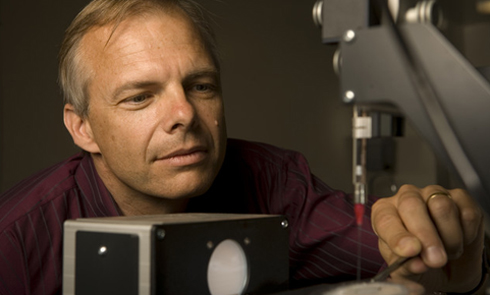Mark Wiesner to Receive the 2011 Clarke Prize
May 17, 2011
FOUNTAIN VALLEY, Calif. – The National Water Research Institute (NWRI) announced today that environmental engineer Mark R. Wiesner, the James L. Meriam Professor of Civil and Environmental Engineering Duke University, is the eighteenth recipient of the NWRI Athalie Richardson Irvine Clarke Prize for excellence in water research.
Wiesner was selected as the 2011 recipient because of his efforts and leadership in improving water quality through advancements in membrane and nanotechnology research, the NWRI said.
 “I am very honored to receive the Clarke Prize,” said Wiesner. “This prize is a great reflection on the efforts of a talented group of student-colleagues with whom I’ve had the privilege to work.”
“I am very honored to receive the Clarke Prize,” said Wiesner. “This prize is a great reflection on the efforts of a talented group of student-colleagues with whom I’ve had the privilege to work.”
Consisting of a gold medallion and $50,000 award, the NWRI Clarke Prize is given each year to recognize research accomplishments that solve real-world water problems and to highlight the importance of and need to continue funding this type of research.
“This year’s winner is an active researcher who is just outstanding,” said the chair of the selection committee, Roy Spalding, professor in the Department of Agronomy & Horticulture at the University of Nebraska. “Mark Wiesner is forward-thinking. Not only has he made innovations in the area of membrane technology, but he has also adapted to changes in the field. While others are doing basic research, he is out looking at the next step: assessing the risks involved with applying new technologies to water treatment.”
Wiesner’s career spans three decades. While still a post-doc, he was among the first American scientists to research the application of low-pressure membranes to water treatment, considered at that time an “emerging” technology. Membranes are thin, porous materials used to filter particles from water during the treatment process. Today, state-of-the-art water supply facilities use membranes as part of the water purification process. Back then, however, he initiated research on the factors controlling membrane performance, and proposed using coagulants as a pretreatment to remove organic matter and prevent membrane fouling. The practice of coagulation as a pretreatment has now become a widely accepted standard for water and wastewater treatment with membranes.
Later, he and his students developed financial models that predicted the circumstances in which membrane filtration would be cost-competitive with conventional water treatment technologies – an achievement that was honored with the Rudolph Hering Award from the American Society of Civil Engineers in 1995. The following year, he edited and co-authored the first membrane process book for environmental engineers, Water Treatment Membrane Processes.
Wiesner’s efforts to improve the performance of water treatment membranes led him to a new area of research: investigating the uses of technology at the molecular level, a field now known as “nanotechnology.” Initially working on applications of nanochemistry to membrane science, he also explored the use of nanomaterials for environmental remediation, as advanced sorbents in water treatment, and as “smart” disinfectants to inactivate viruses without creating harmful byproducts. His work in developing nanomaterial-based technologies for water treatment led him to consider the possible detrimental effects that these materials might have on human health and the environment – in effect, pioneering the field of environmental implications of nanotechnology.
Since the late 1990s, Wiesner has taken the lead in studying the fabrication, transport, fate, toxicity, and risk of nanoparticles in the environment. He co-edited the textbook, Environmental Nanotechnology, in 2007, and currently serves on a National Research Council committee to develop a research strategy for environmental, health, and safety aspects of engineered nanomaterials.
One of his major accomplishments was the creation of the Center for the Environmental Implications of NanoTechnology (CEINT) at Duke University, which he serves as director. A multidisciplinary research effort supported by the National Science Foundation and U.S. Environmental Protection Agency, CEINT is focused on understanding nanomaterial behavior from the nano-scale to the ecosystem-scale and identifying possible risks to human health and the environment. These achievements, among others, have earned Wiesner recognition as the leading researcher in water treatment and environmental nanotechnology.
The NWRI Clarke Prize will be presented to Wiesner July 14, at the 18th Annual NWRI Clarke Prize Lecture and Award Ceremony, to be held at the Hyatt Regency Newport Beach in Orange County, California. Established in 1993 in honor of NWRI’s co-founder, the late Athalie Richardson Irvine Clarke, the NWRI Clarke Prize is one of only a dozen water prizes awarded worldwide and has been distinguished by the International Congress of Distinguished Awards as one of the most prestigious awards in the world.
Recent past recipients of the NWRI Clarke Prize include: environmental engineer Jerald L. Schnoor, of the University of Iowa (2010); environmental biotechnologist Bruce E. Logan, of Pennsylvania State University (2009); aquatic scientist Nancy N. Rabalais, of the Louisiana Universities Marine Consortium (2008); environmental engineer James L. Barnard, P.E., of Black & Veatch Corporation (2007); water-quality engineer Philip C. Singer, P.E., of the University of North Carolina at Chapel Hill (2006); and water-quality engineer Menachem Elimelech, of Yale University (2005).
More information about the NWRI Clarke Prize can be found at www.nwri-usa.org/ClarkePrize.htm.
The National Water Research Institute (NWRI) was founded in 1991 by a group of Southern California water agencies in partnership with the Joan Irvine Smith and Athalie R. Clarke Foundation to promote the protection, maintenance, and restoration of water supplies and to protect the freshwater and marine environments through the development of cooperative research work. NWRI’s member agencies include Inland Empire Utilities Agency, Irvine Ranch Water District, Los Angeles Department of Water and Power, Orange County Sanitation District, Orange County Water District, and West Basin Municipal Water District.
